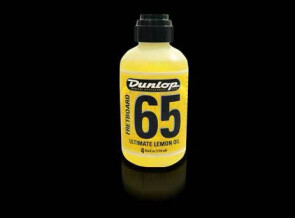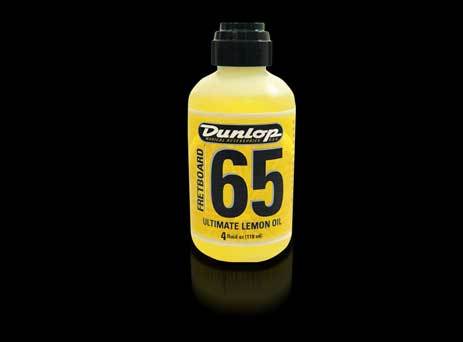Insatisfait(e) des avis ci-contre ?
Filtres
Nos membres ont également aimé :
4.2/5(5 avis)
20 %
80 %
Donner un avis
Avis des utilisateurs
 Zorro9820
Zorro9820Du neuf
Publié le 24/06/15 à 22:49J'ai eu ma folk électroacoustique étant encore jeune, l'entretien de la guitare n'étais pas mon fort, je dois l'avoir depuis 6 ans et pour la première fois j'ai passé l'huile de citron pendant le changement des cordes : la guitare paraît neuve, super propre, le bois a repris de la couleur est a présent magnifique !
Super produit d'entretien !31 shyish
shyishÇa me va!
Publié le 16/01/13 à 10:06Utilisation depuis plusieurs années pour nettoyer la touche de mes guitares et les frettes au passage.
Le produit fait ce qu'on attend de lui, ça nettoie, ça nourrit, et en plus ça sent bon!
Aucun problème détecté sur les touches de mes guitares qui sont respectivement en palissandre et en ébène.
Rapport Q/P honnête, pas de souci, je l'utilise depuis longtemps et continuerai probablement pendant longtemps encore.20 Anonyme
Anonyme Pas mal du tout !
Publié le 16/12/12 à 18:31Flacon d'huile de citron avec applicateur pour l'entretien des touches de guitares en palissandre ou ébène.
Je l'utilise depuis 1 an et c'est d'ailleurs la première fois que je passe de l'huile sur la touche de mes guitares (palissandre). Il faut dire que je suis plutôt du genre soigneux et que j'essaie, dans la mesure du possible, de me laver les mains avant de jouer.
Je sais que les avis sont partagés concernant l'utilisation d'un tel produit pour les touches mais j'ai voulu essayer. Ne pas l'utiliser sur des touches en érable.
Il a très bien fait son boulot (nettoyage) et redonné un coup de jeune à la touche de mes guitares lors du remplacement des cordes. Il faut essuyer l'excès d'hu…Lire la suiteFlacon d'huile de citron avec applicateur pour l'entretien des touches de guitares en palissandre ou ébène.
Je l'utilise depuis 1 an et c'est d'ailleurs la première fois que je passe de l'huile sur la touche de mes guitares (palissandre). Il faut dire que je suis plutôt du genre soigneux et que j'essaie, dans la mesure du possible, de me laver les mains avant de jouer.
Je sais que les avis sont partagés concernant l'utilisation d'un tel produit pour les touches mais j'ai voulu essayer. Ne pas l'utiliser sur des touches en érable.
Il a très bien fait son boulot (nettoyage) et redonné un coup de jeune à la touche de mes guitares lors du remplacement des cordes. Il faut essuyer l'excès d'huile avec un chiffon après application.
L'applicateur est efficace et permet d'économiser de l'huile. D'ailleurs, je pense que ce flacon devrait m'accompagner pour le restant de mes jours.
Bon rapport qualité/prix et surtout très bon rapport nombre d'applications/prix.Lire moins30 MountAnDewMe
MountAnDewMeNettoyant manche Excelent et revitalisant.
Publié le 06/08/12 à 23:40 (contenu en anglais)There are so many varying opinions on what to use and not to use to clean a fret board. Let us start by stating that this product is only to be used in certain situations. Only use this on unfinished porous fret board wood such as rosewood. Never ever use this near any polyurethane or nitrocellulose finishes. It will deteriorate them. Also be very sire to follow proper cleaning guidelines before trying to use this product. It is not made from lemons but a petroleum distillate and if used improperly it can destroy finishes and loosen glue.
(contenu en anglais)There are so many varying opinions on what to use and not to use to clean a fret board. Let us start by stating that this product is only to be used in certain situations. Only use this on unfinished porous fret board wood such as rosewood. Never ever use this near any polyurethane or nitrocellulose finishes. It will deteriorate them. Also be very sire to follow proper cleaning guidelines before trying to use this product. It is not made from lemons but a petroleum distillate and if used improperly it can destroy finishes and loosen glue.
OK with that all being said let me tell you that there are very few alternatives to this product that I would suggest over it. It does wonders for cleaning the grime off of and out of the fret board that our natural oils and sweat leave behind. Secondly it provides these woods with an essential infusion of oil that they need to stay healthy. Many people do not realize that when a rosewood fret board starts to get that very open grained look to it or you start to notice an ashy grayness to it that it is in desperate need of help. Left in this state for to long the wood will dry and possibly crack causing a slew of fret board related issues. Use of this product is simply. Carefully apply it in small well placed doses, wipe it with one cloth, and then sop up all the residual oil promptly. It only takes a few seconds for the fret board to get replenished and done properly will ensure the long life of your prized instrument.
The only reason I took points away from this product is I am not a fan of the applicator. I would rather suggest using a linen type cloth to apply the product and clean the grime off before removing the excess. I find that the applicator can be a bit unpredictable and I would rather make a mistake on a cloth than on my fret board.00 nickname009Publié le 30/01/12 à 10:14
nickname009Publié le 30/01/12 à 10:14 (contenu en anglais)This is the industry standard go-to lemon oil. I don’t know any other brand or any other make to be honest with you. All I recognize is this Dunlop version. And I don’t know if there are others that vary too much from each other, actually I don’t think they do very too much from each other to begin with. However, why I chose this and stuck with the Dunlop is because of the ingenius sponge top! This is the absolute most perfect way to apply lemon oil on fingerboards or anything! It’s clean, sanitary and efficient! Lemon oil can be used in a variety of ways instead of just moistening the fretboard, I’ve also used it to match the tint of certain unfinished woods with others I find it’s great for such an application. As most people know, I personally wouldn’t oil my board everyday but maybe every string change to keep the wood looking good and to prevent those cracklines (seldom in white color) that you see. It’s also good for restoration projects if you’ve got old guitars laying around that haven’t been treated to well, once the frets are cleaned and the gunk is removed you can apply the lemon oil and get a really clean and fresh looking fingerboard, a healthy fingerboard is a good fingerboard! Also helps to remove the fake dye that some guitar companies put on their fingerboards to get a darker rosewood look. This fake dye is the cause to your finger turning black everytime after you play your guitar. Who would want black fingers everytime you play?! Use lemon oil, let it soak in a bit, wipe it off and repeat. Oh, yes and I used this primarily on dark rosewood or dark unfinished wood, it’s not completely necessary for maple boarded guitars and such as the maple grains are quite tight and sealed unlike rosewood and mahogany which leave a bit more to desire.
(contenu en anglais)This is the industry standard go-to lemon oil. I don’t know any other brand or any other make to be honest with you. All I recognize is this Dunlop version. And I don’t know if there are others that vary too much from each other, actually I don’t think they do very too much from each other to begin with. However, why I chose this and stuck with the Dunlop is because of the ingenius sponge top! This is the absolute most perfect way to apply lemon oil on fingerboards or anything! It’s clean, sanitary and efficient! Lemon oil can be used in a variety of ways instead of just moistening the fretboard, I’ve also used it to match the tint of certain unfinished woods with others I find it’s great for such an application. As most people know, I personally wouldn’t oil my board everyday but maybe every string change to keep the wood looking good and to prevent those cracklines (seldom in white color) that you see. It’s also good for restoration projects if you’ve got old guitars laying around that haven’t been treated to well, once the frets are cleaned and the gunk is removed you can apply the lemon oil and get a really clean and fresh looking fingerboard, a healthy fingerboard is a good fingerboard! Also helps to remove the fake dye that some guitar companies put on their fingerboards to get a darker rosewood look. This fake dye is the cause to your finger turning black everytime after you play your guitar. Who would want black fingers everytime you play?! Use lemon oil, let it soak in a bit, wipe it off and repeat. Oh, yes and I used this primarily on dark rosewood or dark unfinished wood, it’s not completely necessary for maple boarded guitars and such as the maple grains are quite tight and sealed unlike rosewood and mahogany which leave a bit more to desire.
00






